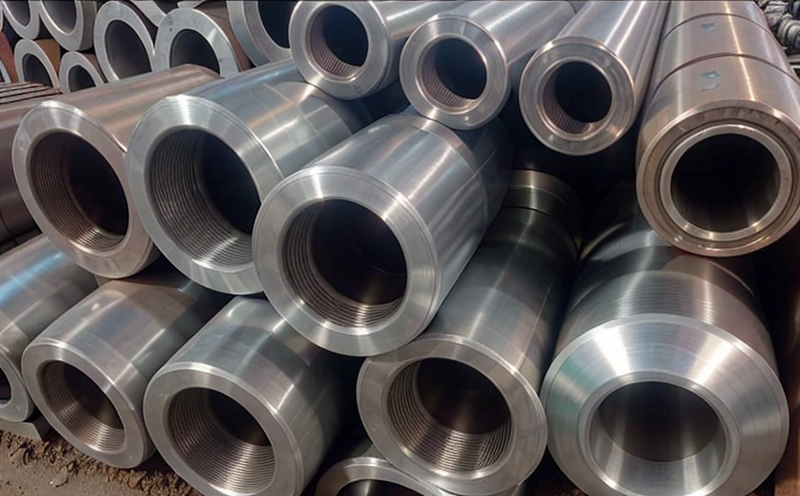EN 60068-2-11 Salt Spray Corrosion Testing
The EN 60068-2-11 standard is an internationally recognized method for assessing the resistance of materials, coatings, and assemblies to salt spray corrosion. This test is crucial in evaluating the durability of ferrous metals and alloys used in HVAC equipment under harsh environmental conditions. Salt spray testing simulates the corrosive environment found near coastal areas or in industrial settings where high humidity and exposure to salt-laden air are common.
The process involves exposing specimens to a continuous mist of sodium chloride (NaCl) solution, which mimics the atmospheric corrosion that ferrous metals may encounter over time. The test is designed to accelerate the aging process by providing a controlled environment that exposes materials to high levels of humidity and corrosive salts. This allows manufacturers to identify potential weaknesses in their products before they reach market.
Testing according to EN 60068-2-11 ensures compliance with international standards, which is essential for businesses operating globally or targeting specific markets like the European Union. The test results provide valuable insights into product longevity and can help guide design improvements. By adhering to this standard, manufacturers demonstrate their commitment to quality assurance and reliability.
The testing procedure involves several critical steps:
- Specimen preparation: Ensuring that samples are clean, dry, and free from contaminants prior to testing.
- Mist generation: Producing a stable mist of NaCl solution with controlled humidity levels.
- Exposure duration: Specimens are exposed for specific durations depending on the desired test conditions.
The acceptance criteria involve monitoring the appearance and integrity of the specimen over time. Any visible changes such as rust formation, flaking, or loss of coating adhesion indicate a failure in corrosion resistance. Compliance with these standards ensures that products can withstand harsh environments without degrading prematurely.
Real-world applications for EN 60068-2-11 testing include:
- Air handling units (AHUs) and evaporators used in commercial HVAC systems.
- Exterior components of heat exchangers that are exposed to the elements.
- Cooling towers where constant exposure to salt-laden air is a concern.
By incorporating EN 60068-2-11 into their quality control processes, manufacturers can enhance product reliability and extend service life. This not only benefits the end-user by providing more durable equipment but also contributes positively to long-term sustainability efforts within the HVAC industry.
Quality and Reliability Assurance
The implementation of EN 60068-2-11 salt spray corrosion testing plays a pivotal role in maintaining high standards of quality and reliability across various sectors, particularly those involving ferrous metals and alloys. This process ensures that HVAC equipment meets stringent international standards, thereby enhancing overall performance and extending product lifespan.
Quality assurance (QA) involves ensuring that all products meet specified requirements consistently throughout the manufacturing process. For HVAC equipment manufacturers, this means verifying that each component has been subjected to rigorous testing before being incorporated into final assemblies. Compliance with EN 60068-2-11 helps achieve this goal by providing a standardized methodology for evaluating corrosion resistance.
Reliability assurance focuses on ensuring consistent performance under expected operating conditions over extended periods. By subjecting ferrous metal parts to accelerated aging through salt spray testing, manufacturers can identify potential failures early in the development cycle. This allows them to make necessary adjustments and improvements before products reach customers, ultimately leading to more dependable HVAC systems.
Regular QA and reliability assessments based on EN 60068-2-11 help establish trust among stakeholders—customers, regulatory bodies, and investors alike—who value proven quality and performance. It also fosters innovation by encouraging continuous improvement efforts aimed at developing even more resilient materials and coatings for use in demanding environments.
Through adherence to this standard, manufacturers contribute significantly to maintaining industry standards while promoting sustainable practices that benefit both current and future generations.
Customer Impact and Satisfaction
Implementing EN 60068-2-11 salt spray corrosion testing has a direct positive impact on customer satisfaction by ensuring the longevity, reliability, and durability of HVAC equipment. When ferrous metals and alloys used in these systems are subjected to rigorous testing according to this standard, customers receive products that perform as expected even under challenging environmental conditions.
One key aspect impacting customer satisfaction is the extended service life provided by EN 60068-2-11 compliant components. By choosing equipment that has undergone such thorough testing, users can expect fewer maintenance issues and longer periods between necessary replacements. This not only reduces operational costs but also contributes to overall energy efficiency—a critical factor in modern buildings.
Another significant benefit is improved reliability which translates into consistent performance over time. Customers investing in EN 60068-2-11 tested HVAC systems can rest assured that their equipment will function reliably, contributing positively to occupant comfort and building efficiency.
In addition to these tangible benefits, there are intangible advantages as well. For instance, companies demonstrating commitment to high-quality standards through rigorous testing like EN 60068-2-11 often enjoy higher brand loyalty among satisfied customers who appreciate the value they bring. This reputation can translate into increased market share and stronger competitive positions within the industry.
Overall, the impact of implementing this standard on customer satisfaction cannot be understated; it ensures that HVAC equipment not only meets but exceeds expectations set by both consumers and professionals alike.
Environmental and Sustainability Contributions
- By enhancing durability through rigorous testing, EN 60068-2-11 helps reduce waste generated from premature failures of HVAC equipment. This contributes to a more sustainable approach by extending the useful life cycle of products.
- The standard supports recycling efforts by promoting longer-lasting materials that are easier to recover and reuse at end-of-life stages.
- Through improved efficiency, EN 60068-2-11 compliant equipment can contribute significantly to reduced carbon footprints associated with HVAC operations. Energy-efficient systems help lower greenhouse gas emissions while improving indoor air quality.
In summary, the adoption of EN 60068-2-11 salt spray corrosion testing aligns well with broader sustainability goals by fostering a culture of responsible manufacturing and encouraging environmentally conscious practices throughout the supply chain.





